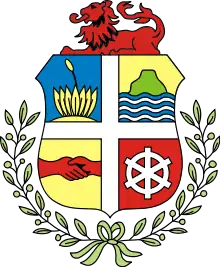Military of Aruba
Defense on Aruba is the responsibility of the Kingdom of the Netherlands. The Netherlands Military forces that protect Aruba include the Royal Netherlands Navy, the Netherlands Marine Corps and the Netherlands Coastguard. There is also a small indigenous "Arubaanse Militie" (ARUMIL) (litr. "Aruban militia") of about platoon strength, and a shared Aruba and Netherlands Antilles Coast Guard consisting of three Damen Stan 4207 patrol boats. All forces are stationed at Marines Barracks Savaneta.
Early history
Up to 1929, there were hardly any military forces present on the Dutch Antilles including Aruba. On the 28th of June 1929 the Venezuelan rebel leader Rafael Simon Urbina attacked Curaçao and took several hostages amongst whom was the governor L. A. Fruytier and the garrison commander Borren. They were all taken to Venezuela where Urbina had hoped to overthrow the Government. His attempt failed and Urbina was taken prisoner. All hostages were returned to Curaçao. Three Dutch soldiers were killed in action during this attack.[1] After Urbina's attack, the Dutch government decided to station one naval ship ("stationsschip") in the Antilles permanently. It also decided to raise a volunteer defence corps on both Curaçao and Aruba (vrijwilligerskorps Curaçao (VKC) and Vrijwilligerskorps Aruba (VKA)). After World War II, the VKA and VKC were redesignated Antiliaanse Militie (ANTMIL) which still exists on Curaçao. When Aruba obtained its independence within the Kingdom of the Netherlands in 1986, the ANTMIL on Aruba was redesignated Arubaanse militie or ARUMIL.
World War II
For the Kingdom of the Netherlands, World War II started with the invasion of the Netherlands by Germany on May 10, 1940. Because of the Lago oil refinery at San Nicolas, Aruba was deemed strategically important to the allied war effort and that same night 180 French marines arrived on Aruba to assist the local military. On July 6 they were replaced by 120 British soldiers who in turn were replaced by the 4th Battalion Queens Own Cameron Highlanders in September. In December an artillery unit from the Dutch East Indies army (KNIL) was also sent to Aruba to improve the defences. Also in December military service became compulsory and the VKA grew in size. All soldiers were billeted near the oil refinery at Savaneta, the present location of the marines barracks. Early 1942, the British troops were replaced by over a thousand American soldiers. The Dutch coastal batteries on Aruba and Curaçao engaged U-boats at least three times during World War II, during the Attack on Aruba in February 1942 and again during the Bombardment of Curaçao. Later a Dutch battery on Curaçao engaged another U-boat when it attacked an oil tanker sailing off the island. None of the batteries hit their targets.[2]
Present
ARUMIL soldiers are volunteers and are led by their own NCOs and officers. The ARUMIL are trained by Royal Netherlands Marines. When basic training is completed every soldier in the ARUMIL becomes an Aruban Marine. Basic training and selection takes place on Aruba, most further training takes place in either the Netherlands or Curaçao. ARUMIL officers have to complete the regular Netherlands Marine Corps Officers training course (Praktische opleiding tot officier der mariniers, POTOM). The ARUMIL platoon works closely with the Dutch Marines company stationed at Aruba.[3]
An increase of instability in South America, specifically Venezuela, made the Netherlands heighten the security level and increase monitoring of the Dutch island in cooperation with the United States.
References
- "S.A.L. (Mongui) Maduro Foundation". Retrieved 27 September 2014.
- "Historia di Aruba". Retrieved 27 September 2014.
- "savariba.com". Archived from the original on 28 April 2009. Retrieved 27 September 2014.
